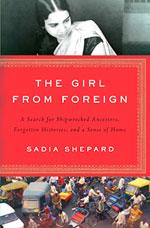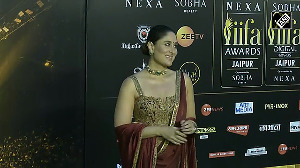It all began when thirteen-year-old Sadia Shepard ventured unannounced into her grandmother's room in Boston one Saturday, and found her applying coconut oil to the head of her mother Samina Quareshi.
"That was a Saturday tradition in our home," recalls Shepard, 33, as she discusses the genesis of her life-affirming memoir The Girl From Foreign: A Search for Shipwrecked Ancestors, Forgotten Histories and a Sense of Home.
Shepard, daughter of an American father and Muslim immigrant mother from Pakistan, recalls that the two women were talking in Urdu. "They were engrossed in their stories," she laughs, and describes her own vivid memory of examining grandmother Rahat Siddiqui's jewelry box, in which she found a pin bearing the name 'Rachel Jacobs' and issued on the day Jacobs passed her nursing exam.
When Shepard asked her nana ("I should have been calling her nani but I called her nana") about this, she was told that Rachel Jacobs was her name before she got married.
"The thing most shocking to me was the fact it could've been the name of someone in my class," Shepard, a documentary filmmaker in New York, says. "How did my Pakistani Muslim grandmother start with a name like Rachel Jacobs?
"This incident led to a conversation that would last until her death when she was 82 and I was 25," she continues. "That started the journey I went on and am still on. I was very surprised by what I was learning. I always assumed all my mother's family was Muslim. I always assumed [nana] was part of that culture."

Shepard's mother was not perturbed by her daughter's curiosity and the revelation that had come out of it. Later, she would encourage her daughter to go to India to find out more about Rachel Jacobs.
"I believe that most people in our family in Pakistan and in America knew about nana's background, but they never really talked about it," she says. "Nana never became a Muslim but she brought up her children as devout Muslims."
Her grandmother explained to Sadia how she had grown up in India in a Jewish family, part of the Bene Israel (Children of Israel) community, thought to be one of the lost tribes that fled Israel 2,000 years ago and landed on Indian shores following a shipwreck.
They lost their Torah, her grandmother told Sadia, but they remembered one prayer, and continued to pray to one God. "So are you Muslim or are you Jewish?" Shepard remembers asking her nana.
"Now I'm a Muslim, but God is the same in both religions," she said.
Shepard produces documentaries for television and film. Her credits include the Outsourcing episode of Morgan Spurlock's award-winning series 30 Days. Her documentary In Search of the Bene Israel premiered recently at the San Francisco Jewish Film Festival. But nothing excites her as much as talking about her book and sharing life stories about her grandmother.
Shepard says in time, she discovered more family secrets. Her grandmother, who studied nursing in India, had eloped with a Muslim man much older than her 16 years. After Partition she followed him, along with his other wives and over a dozen children, to Karachi.
A few months before she died, nana asked Shepard to go to India and look around the places where she had grown up. She said, 'Promise me you'll tell my story.'
"I didn't know what that meant," Shepard says, but there was no way she could ignore the request. As she explains in her book, she was raised by three parents -- her father, her mother, and her nana.
In 2001 Shepard left for India on a Fulbright scholarship and spent two years in the subcontinent, a good part of it at the Film and Television Institute of India in Pune. Out of her travels and encounters came the book The Girl from Foreign.
"I knew that the Bombay my grandmother had lived in would be very different from the city that is now called Mumbai," she says. "Yet I had to visit the places she grew up around, and also look at the tiny Jewish community in the city."
Suketu Mehta, the author of Maximum City: Bombay Lost and Found, called Shepard's book 'A beautifully written memoir about finding home, from an author who is multiply exiled. Told from the heart, The Girl From Foreign performs the unique feat of making the foreign feel familiar.'
Shepard is often asked about the intriguing title of the book. She writes about how, despite wearing a salwar kameez and sporting the name Sadia, she was always looked at as an outsider in India. 'I know how alien I look,' she writes. 'I am paler and taller than everyone else. And in my outdated salwar kameez, I can be pegged as an outsider right away.'
A guard at a facility in Mumbai asks her: 'You are from foreign?'
"While I was living in India, I noticed that people would often refer to places outside of India as 'it's in foreign' or 'she's from foreign'," Shepard says, "and that always intrigued me; the idea that 'foreign' was a singular entity, somewhere unfamiliar that you could visit or be from."
She points out that much of her book is an observation of contemporary India through the eyes of a young Western woman, and she wanted to preface this inquiry with a phrase that stems from how she was seen as that observer.
"The notion of translation, and what gets lost or transformed in communication, is a running theme throughout the book, as is a repeated questioning of what it means to be 'foreign'. The Jews of India are foreign to India, yet have been settled there comfortably for two millennia."
"My grandmother's Jewish background made her foreign in the context of her husband's Muslim family, and yet she was wholly a part of it. And when my mother arrived in the American Midwest in 1964 she did so on a foreign exchange program. At the film school in India where I was a student and later, in the neighborhood where I settled in Bombay, people sometimes referred to me as 'the girl from foreign', and so I took this phrase as the title for the book."
The larger theme of the book could be religious tolerance, she believes. "What my experience in India taught me is that religious faith is not just about theology it's shaped by the different places it's practiced in," she explains. "In order to get beyond the idea of a clash of civilizations between East and West, Islam and Christianity, I think we need to explore plural and hyphenated identities and recognise that no religion is a monolith. I hope that more people come forward to give voice to these kinds of stories."
Though she believes in the value of personal memoir, she never imagined the journals she had kept while in India, and the story that led her to India, was material for a book.
"In the fall of 2003, after I returned from India, I attended a dinner party in Manhattan as the guest of a foundation that had funded my documentary film," she explains. "All the guests at the party were women who had some connection to India, and our host asked each of us to tell our life stories to the group."
"When my turn came, I told the guests that in order to tell the story of my life, I had to tell the story of my family, and I told the story of how my grandmother and grandfather got married, and how I had just returned from two years in India. That night, I was approached by literary agent Fredrica S Friedman, who suggested that I turn the many journals I wrote in India into a book. She later sold the book to The Penguin Press."

Like most stories, hers turned out to have an unexpected sequel. When she returned from India in 2003, Shepard had a sentimental surprise. Her parents asked her to join them at a West Palm Beach cemetery, where she saw a tombstone designed by her parents, swathed in a dark purple velvet shroud inscribed in Hebrew characters, on loan from a local synagogue.
'When the cloth was pulled back,' she writes, 'we saw that my mother and father had placed Nana's two names, Rachel and Rahat, in Hebrew, Arabic, and English script. I imagined how much nana would have enjoyed the moment, the chance to be recognised, in death, for the plurality of who she was.'






 © 2025
© 2025